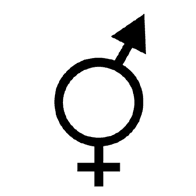This week, I had a chat with Mike Buonaiuto. I work with Mike at Shape History, a social change company. He started Shape History just over a year ago. Since I first met Mike, I’ve come to realise that he has an incredible amount of passion and drive to create social good. One of the issues that Mike is determined to change, is the way in which LGBT people are seen across the world. I remember having a chat on my first or second week at Shape History with Mike at a pub (where all good conversations take place). We somehow got onto the topic of being gay, but in particular, language, categorisation and stigma. The conversation that we had was too good to keep to ourselves (well, what Mike had to say anyway). Mike’s enthusiasm of LGBT issues, coupled with his own personal experiences, combined with me sucking up to him, I thought that this week, it was a good idea to expand our little chat in the pub.
I wanted to start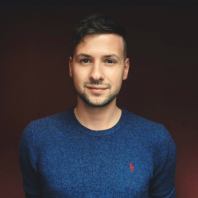 by asking you about your own experience with being gay and the story of when you first ‘came out’?
by asking you about your own experience with being gay and the story of when you first ‘came out’?
The interesting thing about coming out is that you never stop coming out. When you start talking about your first time coming out, it’s obviously the most important because it’s most likely to be the people you care most about. Telling your loved ones is far more likely to be more momentous than telling the shop assistant when you’re buying flowers and they say “hey, nice bunch of flowers for your girlfriend”. You then have to question whether you want to actually come out again. It’s a pivotal moment and I think that given my personality, I take every moment to do it because it forces people to question their outlooks on gender and sexuality; the norms and what is acceptable and what isn’t.
I came out to my parents when I was 19. My dad was from a very strict Italian background, my mum, British. What was fascinating was that my dad was far more accepting of it at first than my mum was. This wasn’t because either of them had a problem with it but because my mum and I have such a close relationship and she felt very hurt that there was a ‘secret’, as it were, that I had kept from her when she thought that I could tell her absolutely anything. In essence, that was it.
Why do you think there’s still a stigma attached to being gay and coming out? Do you think that’s slowly starting to change?
When we’re talking about the general stigma that’s attached to coming out, I don’t really think there’s a stigma anymore but then I’m safe out of the closet and happy with who I am. What I find interesting is when you look at the demographics of young people. I went to a Stonewall event a few weeks ago and they had a statistic that when asked how new graduates define their gender or sexuality, something like 75-80% classify themselves as something other than straight. Many young people from going to university into the work place go back into the closet, which means that they stop being their authentic selves.
Something I will say about coming out today is that the whole Youtube movement has made coming out far more acceptable for young people. When people took to Youtube to make videos to come out publicly, it gave a lot of young people a lot of faith, hope and confidence to do it themselves and be their authentic selves.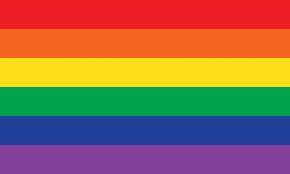
Can you expand on how you think coming out has become easier over the last few years?
The LGBT movement in general- it’s one of the most organised movements in the world; it crosses everything from politics to technologies, through to advocacy to film and media. This has given people confidence to be themselves. There are lot of icons and role models that are doing amazing work around the world, which inspires people. Social media platforms such as Facebook also allows your sexuality visible to people that weren’t already in your immediate circle. Suddenly, you’ve a technology that can tell you that an LGBT person isn’t the man or woman who lives at the end of your road, it’s your brother, it’s your cousin, it’s your second cousin’s friend and you have a familiar connection with that person. This makes the issue far more relevant to you and far more conversations have happened over the last few years that have been able to happen far more quickly than before.
What are your feelings towards the word ‘gay’ itself? It has been colloquially used in a negative way.
It’s an interesting question. I don’t tend to take personal offence. You can talk about re-ownership of language in the way that the word gay has been turned from something that’s negative or derogatory to something that’s defined in the community accurately and re-owning the word. Any word that’s used in a way to segregate or push people aside, you can do it in another way and you can re-own it. I think what’s interesting is when you’re running campaigns like I’ve done; you tend to use words that are more inclusive like ‘LGBT’ because it gives it a serious edge. One word that has started to be used more and more is the word ‘queer’ and re-owning LGBTQ- queer for people who are non-conformist or don’t like to define themselves as any one of the four segments of what the LGBT movement stands for (i.e. ‘Q’, ‘I’, ‘A’). At the end of the day, it’s just a word but words are so important as they define how we look at the past and how we can pave the way for how we look to the future.
Why do you think there are separate terms for gays and lesbians?
People like to put stuff in boxes. We’re labelled and categorised all throughout our lives; it’s the way the society and culture works. The important thing is that people are defining themselves by whatever term that they are, especially if you’ve been out as a gay man or a lesbian woman or a bi-sexual man or woman. When you’ve been portrayed a certain way, such as myself and then I suddenly find a girl attractive, I find it hard to then re-define myself. Does it mean that I’m now bi-sexual? Am I not an authentic gay man? Or does that not matter at all? I think that putting your sexually into boxes, stops you from experiencing or changing in the future.
Why do you think that gay people term their boyfriend or girlfriend as their ‘partner’?
This is an issue of visibility. One of the most important things when trying to create social change because it’s an issue that’s all about the way of connecting people and seeing the familiarity between each other. Sometimes visibility is difficult or exhausting. For instance, when you’re buying flowers for your partner/boyfriend/girlfriend and the shop assistant says ‘that’s a really pretty bunch of flowers for your girlfriend’, it’s exhausted turning around and correcting them. At the end of the day, it’s just easier to say partner and that is a habit that you jump into. It allows you to not come out in every instance where you have to talk about your loved one. It allows you to choose when and where you come out and to whom. I would have no problem with saying the term ‘boyfriend’ but I would have to think about it a bit more than if I said my partner.
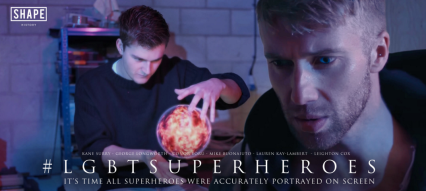
Can you tell me a bit about your LGBT superhero campaign and a little bit about Credence?
Credence is a campaign I created that is the first ever sci-fi film to feature a same-sex couple. We had started this campaign by creating a trailer before we were able to fundraise and create the entire film itself. It was then put on the big screen in Leicester Square in partnership with Wired magazine.
My inspiration behind LGBT superheroes came when I was reading an article, which said that Iceman had come out as gay in the comic books. With this in mind, I thought how 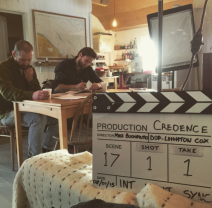 important it is to create a trailer to paint the picture of what it would look like if Iceman were portrayed accurately on screen and to start a conversation online around this. You had the likes of #givecaptainamericaaboyfriend trending which helped push the campaign along and set it up so the media was ready to have this conversation. What’s interesting is the amount of people who have asked us to create the film itself but in essence, Credence was such a big commitment that I’m not ready to dive into that level of what needs to be done.
important it is to create a trailer to paint the picture of what it would look like if Iceman were portrayed accurately on screen and to start a conversation online around this. You had the likes of #givecaptainamericaaboyfriend trending which helped push the campaign along and set it up so the media was ready to have this conversation. What’s interesting is the amount of people who have asked us to create the film itself but in essence, Credence was such a big commitment that I’m not ready to dive into that level of what needs to be done.
What did you take from the Orlando nightclub shooting?
I would say that in the light of Orlando, the world has been rocked in shock. What’s important to understand off the back of it is that there needs to be and there suddenly are strong urges from the people that gun laws need to be tightened. The gun that was used is a war weapon, which has no place in the hands of a civilian in society. The LGBT movement, one of the most mobilised and organised movements in the world has turned our attention onto gun violence as an issue. It could be a wonderful thing in getting the issue addressed.
Finally, in your own words, what is Shape History?
After the work we did surrounding marriage equality, and seeing our name, Shape History in the history books, it struck me that anyone of any talent or skill can use what they are good at to influence and shape culture. Taking this on board, if you feel as though you’re someone who’d like to bring about social change, please get in touch.
